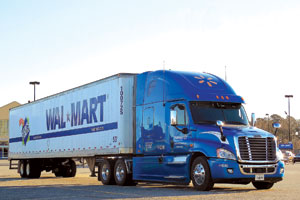Federal Judge Rules Against Wal-Mart Stores for Violating California Law in Drivers’ Case

The drivers asserted that Wal-Mart violated the California Labor Code by failing to properly compensate them for time spent on nondriving activities, such as wait time, inspections and fueling and by failing to provide adequate meal and rest breaks.
In September 2014, Judge Susan Illston of the U.S. District Court for the Northern District of California certified the class, finding that the drivers’ claims raised common questions about the company’s “piece-rate” pay policies. In the most recent decision, Illston granted partial summary judgment to the drivers on their claim that Wal-Mart violated California law by failing to pay minimum wage for all hours worked.
Wal-Mart argued the drivers were properly compensated for certain nondriving activities because those tasks were performed at the same time as paid activities.
However, state law provides that employees must be directly compensated for all time worked, Illston said, and activities that are not separately compensated “may not properly be built in or subsumed into the activity pay component of Wal-Mart’s pay policies.”
The drivers are also due minimum wage for time spent taking rest periods because the drivers were subject to Wal-Mart’s control during those periods, Illston said.
Wal-Mart paid its drivers based on mileage, activity pay and nonactivity pay. According to the company’s “driver pay manuals,” paid activities included loading and unloading freight, and wait time after 45 minutes. Unpaid activities included time spent at weigh scales, waiting at a driver’s home for a work assignment, completing paperwork and dropping off a trailer for fueling or maintenance.
The drivers argued that by following the policies in the pay manuals, Wal-Mart failed to pay class members at least minimum wage for all hours worked.
Although the pay manuals specified activities for which drivers were not paid, Wal-Mart argued that those activities were subsumed into paid activities. As an example, the company said that inspections were performed at the same time as paid loading and unloading activities. Wal-Mart also said drivers were permitted to take rest breaks during wait time and stops.
“[A] piece-rate formula that does not compensate directly for all time worked does not comply with California Labor Codes, even if, averaged out, it would pay at least minimum wage for all hours worked,” Illston’s ruling said.
The drivers also claimed they were entitled to minimum wage for DOT-mandated “layover” rest periods. The court agreed. According to DOT regulations, a “driver may not drive without first taking 10 consecutive hours off duty.” Wal-Mart paid drivers $42 for layovers that were taken in the tractor cab, Illston said, but the 2008 pay manual stated that layovers taken at the driver’s residence were not compensable without prior management approval.
Although Wal-Mart argued that drivers often left their trucks to eat, shop, socialize or exercise during layovers, Illston said “the physical location of the layover — inside the tractor cab and not at the driver’s residence — was specified and controlled by Wal-Mart.”

